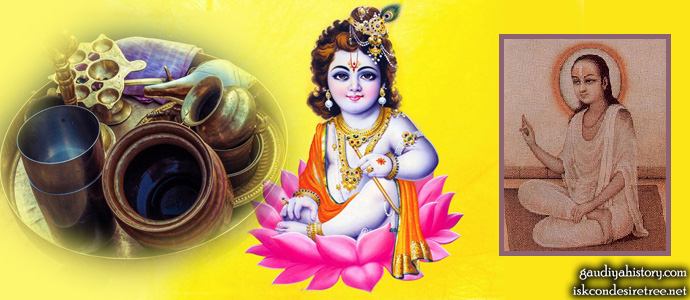He appeared in 1479 in south India and disappeared in 1531. He detached himself from the tradition of Vishnu Swami and started his own school, which is prominent today in Mathura-Vrindavana. In his school there are no sannyasis (renounced monks) but only householders.
Vallabha travelled extensively in India to engage in philosophical debates. He wrote the Tattvartha dipa nibandha (divided in three parts, one about Bhagavad-gita, one about Shrimad-Bhagavatam, and the third a comparison between philosophies), Anubhasya (non completed commentary on Vedanta sutra), Purva mimamsa bhasya (commentary on Jaimini's karma kanda philosophy), Subodhini (non completed commentary on Bhagavatam), and the Sodasa grantha (16 books containing the essence of his teachings).
For Vallabha, the realization of the Para Brahman, the complete (purna) aspect of the Brahman, can be achieved only through pushti ("nourishment"), or total surrender to God who blesses the soul with His grace. In his philosophy there are different categories of jivas: suddha, samsarin (further divided into daivi, madhyama and danava) and mukta.
Vallabha Acharya probably came to Puri the first time in 1489 as a young boy, but returned in 1519 for his preaching. He was proud to be a great scholar and started a Bhakti Marga center in Varanasi. He contacted Lord Chaitanya in Prayaga (Allahabad) and was sent to debate with Advaita Acharya.
So he started to criticize the Sankirtana (congregational chanting of the Lord’s Holy Names) movement by objecting that, if the Devotees were worshiping Lord Krishna in the madhurya rasa (mood of loving exchanges) they should not chant His name, as a faithful wife is not supposed to call her husband confidentially by his name, but always address him with a respectful title. Advaita Acharya replied "on His order, we are doing". The point is that if the husband specifically requests the wife to call him intimately by his name, a faithful and loving wife should do so happily to please her husband. Similarly, Lord Krishna has ordered all of us to chant His name intimately, so as faithful wives and servants of the Lord, we should do so.
It is said that in the end Vallabha Bhatta was convinced of the superiority of the teachings of Lord Chaitanya and from the worship of Bala Gopala was initiated into madhurya rasa by Gadadhara Pandita.
The son of Vallabha Bhatta, Vittala, adopted Gita Govinda as his text for teaching Sanskrit in his school.
The preaching of Vallabha Bhatta made the worship of Bala Gopala popular in all Hindu homes. His philosophy distinguished the two different roads in Vishnu worship as Maryada bhakti (or devotion in respect), where God is worshiped as the Supreme Brahman and Pusthi bhakti (or devotion in intimacy).
Source : http://www.stephen-knapp.com/four_sampradayas.htm
